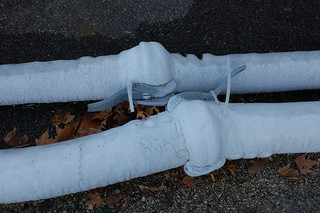Want to Prevent Frozen Pipes? Here's How.
 When outdoor temperatures drop and cold winds blow, your water pipes are in danger. Inclement conditions can cause them to freeze. Or rather, the water inside will freeze, expanding as it does so. The ice thus formed acts as a plug. It blocks the pipe and causes pressure to build up between the frozen section and the closed faucet further downstream. This pressure, not the freezing itself, may cause the pipes to burst eventually, creating one heck of a mess in your home. The good news is that frozen and burst pipes can be prevented, with a bit of simple maintenance.
When outdoor temperatures drop and cold winds blow, your water pipes are in danger. Inclement conditions can cause them to freeze. Or rather, the water inside will freeze, expanding as it does so. The ice thus formed acts as a plug. It blocks the pipe and causes pressure to build up between the frozen section and the closed faucet further downstream. This pressure, not the freezing itself, may cause the pipes to burst eventually, creating one heck of a mess in your home. The good news is that frozen and burst pipes can be prevented, with a bit of simple maintenance.
Insulation
Safeguard pipes against freezing by protecting them from cold, windy conditions, ideally before winter begins. Start with insulation. Insulate large areas which pipes pass through, such as crawl spaces, by using foam board and filling in with fiberglass. Insulation sleeves to cover the pipes are a very effective localized solution, but should not be used for any pipe that runs adjacent to an uninsulated exterior wall -- they will block indoor heating as well as the cold outside air.
Apply temporary seals to your foundation vents and air inlets. Seal any cracks and holes with caulk.
Outdoors
Leaving a garden hose connected to your outdoor faucet when winter is near is one of the 10 plumbing mistakes people tend to make. Disconnect the water supply to your swimming pool and other outdoor pipes and then turn on the faucets to drain water. (Be sure to turn them off when the process is finished.) Cover any outdoor spigots and winterize your sprinkler system.
Heating
Keeping pipes warm minimizes the likelihood of a freeze. Maintain a home temperature of at least 55 degrees F, even if no one is home. When you are planning to be away for an extended period, drain your water system to stay safe in case of a cold snap.
Alternatively, use a space heater near the pipes to keep the water at a temperature above freezing. Another option is electric heating tape or cables, preferably with a self-regulating thermostat. These three methods should be used with care, as there is a possibility they may cause a house fire.
Plumbing pipes on an uninsulated exterior wall can be warmed by opening the bathroom vanity and kitchen cabinets in the room. This will direct heat from your bathroom or kitchen toward the pipes.
Keep your garage doors closed when not in use to minimize cold air flow. This is especially important when the water supply lines are located in the garage.
Water
At times of extreme cold or when you will be away from home for an extended period in winter, the two best solutions may seem contradictory. The first method is to drain the water completely from the pipes leaving no liquid in the pipes to freeze. To accomplish this, turn off the main valve, and then turn on all the taps in your home. Allow the water remaining in the pipes to run out. When you're ready to reverse the process, turn on the valve and open the faucets, allowing the pipes to refill.
The second way is to let a small amount of water drip continually from the tap. You will relieve pressure buildup -- and therefore, a potential burst -- in the case that the pipes become frozen; the hot and cold water lines should both be left open slightly. To avoid wastage, you may want to collect the clean water from either method and use it to fill your coffee maker or water houseplants.
Be Prepared
Before you are faced with an emergency, check your homeowner's insurance to see whether it covers damage caused by burst pipes, since different policies offer different options. Consider installing leak alarms that will detect abnormal levels of moisture in the air of your home. These may be either basic battery-operated devices or part of a smart-house system that is controlled via your phone. Finally, in case all your prevention is in vain, purchase a temporary patch kit as a quick fix for burst pipes until you can reach a qualified plumber.
If you’re now wondering to yourself, “where can I find a licensed plumber near me?”, Networx is your best help to getting qualified help.
Laura Firszt writes for networx.com.
Looking for a Pro? Call us (866) 441-6648

Plumbing Average Costs
Plumbers Experiences

Gas Line Replacement By A Plumber Who Takes Pride In His Work

Gas Line Installation Made Simple



